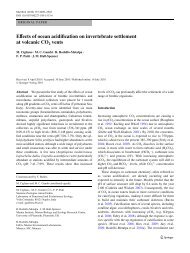South Africa's White Shark cage-diving industry - Save Our Seas ...
South Africa's White Shark cage-diving industry - Save Our Seas ...
South Africa's White Shark cage-diving industry - Save Our Seas ...
You also want an ePaper? Increase the reach of your titles
YUMPU automatically turns print PDFs into web optimized ePapers that Google loves.
<strong>South</strong> Africa’s <strong>White</strong> <strong>Shark</strong> <strong>cage</strong>-<strong>diving</strong> <strong>industry</strong> -<br />
is their cause for concern?<br />
Following the 1998 spate of shark attacks in the eastern and western Cape, significant public<br />
concerns arose regarding the impact of <strong>cage</strong> <strong>diving</strong>, and research projects were initiated to<br />
address these. As a response, DEAT, in conjunction with the <strong>industry</strong>, researchers and other<br />
interested parties held a number of meetings to form a workable Code of Conduct based on<br />
a precautionary approach (Oosthuizen pers. comm.). The most crucial of these operational<br />
stipulations (in regard to links between <strong>cage</strong> <strong>diving</strong> and attacks) were concerned with limiting<br />
the total allowable effort, confinement activities to seal islands where natural chumming<br />
occurs, and forbidding of any intentional feeding of sharks. Within these and other regulatory<br />
confines, DEAT is satisfied they have fulfilled their role in applying the MLR's act in a<br />
responsible, informed and<br />
cautious manner with regard<br />
to the industries management.<br />
Why then does controversy<br />
still surround the <strong>cage</strong>-<strong>diving</strong><br />
<strong>industry</strong>? The authors feel that<br />
it is primarily due to the fact<br />
that, despite regulations<br />
existing, some (not all)<br />
operators disregard<br />
regulations. The failure to<br />
comply by some of the<br />
Table 3. Incidences of disregarding regulations in television<br />
productions/daily operations.<br />
� Regular and repeated intentional feeding of sharks,<br />
� Use of illegal chums and baits (incl. seals and whales),<br />
� Taking of visitors (usually media related) outside of the <strong>cage</strong>s<br />
safety to 'free dive' with white sharks,<br />
� The intentional pulling of sharks towards the vessels and <strong>cage</strong>s,<br />
frequently causing collisions,<br />
� Towing of 'human/surfboard' type decoys to elicit white shark<br />
breaches,<br />
� Illegally landing on seal Island's for filming,<br />
� Permitting visitors to carry out irresponsible activities (e.g. climbing<br />
upon a whale carcass whilst sharks feed on it, throwing gumballs<br />
into a sharks mouth etc.).<br />
operators is witnessed by <strong>South</strong> Africans in the numerous 'white shark television features'<br />
that have used the <strong>cage</strong>-<strong>diving</strong> operators as their production bases (examples presented in<br />
Table 3). It must be asked; why ‘compliance’ is such a tough issue in a relatively confined<br />
<strong>industry</strong> (12 permitted operators working from three localities). We briefly have identified<br />
three areas that we feel have contributed to the failure of the <strong>industry</strong> to uniformly adhere to<br />
existing regulations.<br />
� Client and operator expectation: When assessing the readiness of some operators<br />
to disregard regulations, particularly with respect to feeding, we must understand the<br />
expectation of clients arriving at a <strong>cage</strong> <strong>diving</strong> vessel (incl. tourists, journalists,<br />
production companies). For the previous 30 years the white shark has been portrayed<br />
as the ultimate hunter of humans, and it is undeniably this 'JAWS reputation' that has<br />
been the catalyst for the <strong>cage</strong> <strong>diving</strong> industries' success. Such a marketing<br />
opportunity has being capitalized on by many of the operators (i.e. the adrenaline<br />
adventure rather than the ecotourism experience) further enhancing visitor<br />
expectation of teeth gnashing excitement. Thus significant pressure exists for<br />
operators disregard certain operational regulations (particular feeding and wrestling<br />
sharks) to produce a 'good show'.<br />
Pg 55<br />
ANNEXURE 1






